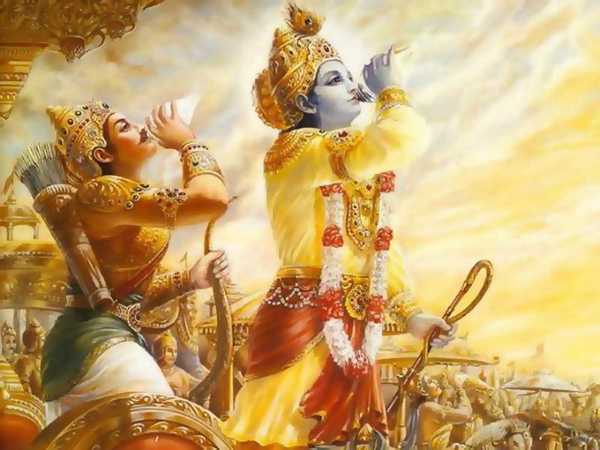Chapter 4

“Vaisampayana said,–“After the Pandavas had gone to the forest,Dhritarashtra the son of Amvika, whose knowledge was his eye,[14] becameexceedingly sorrowful. And seated at his ease the king addressed thesewords to the virtuous Vidura of profound intelligence, ‘Thy understandingis as clear as that of Bhargava.[15] Thou knowest also all the subtletiesor morality, and thou lookest on all the Kauravas with an equal eye. O,tell me what is proper for me and them. O Vidura, things having thustaken their course, what should we do now? How may I secure the goodwillof the citizens so that they may not destroy us to the roots? O, tell usall, since thou art conversant with every excellent expedient.’
“Vidura said, ‘The three-fold purposes, O king (viz., profit, pleasure,and salvation), have their foundations in virtue, and the sages say thata kingdom also standeth on virtue as its basis. Therefore, O monarch,according to the best of thy power, cherish thou virtuously thy own sonsand those of Pandu. That virtue had been beguiled by wicked souls withSuvala’s son at their head, when thy sons invited the righteousYudhishthira and defeated him in the match at dice. O king, of this deedof utter iniquity I behold this expiation whereby, O chief of the Kurus,thy son, freed from sin, may win back his position among good men. Letthe sons of Pandu, obtain that which was given unto them by thee. For,verily, even this is the highest morality that a king should remaincontent with his own, and never covet another’s possessions. Thy goodname then would not suffer nor would family dissensions ensue, norunrighteousness be thine. This then is thy prime duty now,–to gratifythe Pandavas and disgrace Sakuni. If thou wishest to restore to thy sonsthe good fortune they have lost, then, O king, do thou speedily adoptthis line of conduct. If thou dost not act so, the Kurus will surely meetwith destruction, for neither Bhimasena nor Arjuna, if angry, will leaveany of their foes unslain. What is there in the world which isunattainable to those who cannot among their warriors Savyasachin skilledin arms; who have the Gandiva, the most powerful of all weapons in theworld, for their bow; and who have amongst them the mighty Bhima also asa warrior? Formerly, as soon as thy son was born, I told thee,–Forsakethou this inauspicious child of thine. Herein lieth the good of thyrace.–But thou didst not then act accordingly. Nor also, O king, have Ipointed out to thee the way of thy welfare. If thou doest as I havecounselled, thou shalt not have to repent afterwards. If thy son consentto reign in peace jointly with the sons of Pandu, passing thy days in joythou shalt not have to repent. Should it be otherwise, abandon thou thychild for thy own happiness. Putting Duryodhana aside, do thou installthe son of Pandu in the sovereignty, and let, O king, Ajatasatru, freefrom passion, rule the earth virtuously. All the kings of the earth,then, like Vaisyas, will, without delay, pay homage unto us. And, O king,let Duryodhana and Sakuni and Karna with alacrity wait upon the Pandavas.And let Dussasana, in open court, ask forgiveness of Bhimasena and of thedaughter of Drupada also. And do thou pacify Yudhishthira by placing himon the throne with every mark of respect. Asked by thee, what else can Icounsel thee to do? By doing this, O monarch, thou wouldst do what wasproper.’
‘Dhritarashtra said, ‘These words, O Vidura, then thou hast spoken inthis assembly, with reference to the Pandavas and myself, are for theirgood but not for ours. My mind doth not approve them. How hast thousettled all this in thy mind now? When thou hast spoken all this onbehalf of the Pandavas, I perceive that thou art not friendly to me. Howcan I abandon my son for the sake of the sons of Pandu? Doubtless theyare my sons, but Duryodhana is sprung from my body. Who then, speakingwith impartiality, will ever counsel me to renounce my own body for thesake of others? O Vidura, all that thou sayest is crooked, although Ihold thee in high esteem. Stay or go as thou likest. However much may shebe humoured, an unchaste will forsaketh her husband.’
“Vaisampayana said, O king, saying this Dhritarashtra rose suddenly andwent into the inner apartments. And Vidura, saying ‘This race is doomed’went away to where the sons of Pritha were.'”




